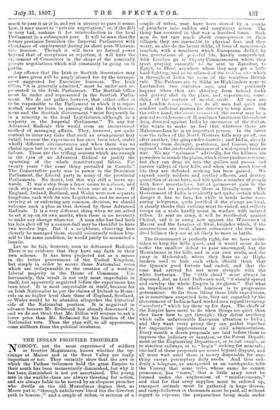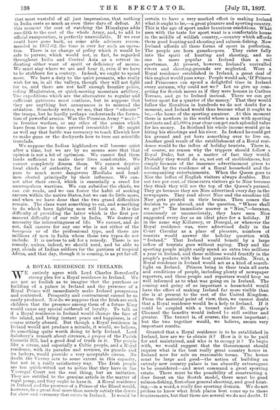THE INDIAN FRONTIER TROUBLES.
NOBODY, not the most experienced of soldiers or frontier Magistrates, knows whether the up- risings at Maizar and in the Swat Valley are really important or not. They certainly show that the awe in which the Pathan tribesmen hold the great Empire to their south has been momentarily diminished, but why it has been diminished is not yet ascertained. The young men in the warlike clans are always thirsting for action, and are always liable to be moved by an eloquent preacher who dwells on the old Mussulman dogma that, as Moore put it, "through unbelievers' blood lies the directest path to heaven ;" and a couple of tribes, or sections of a couple of tribes, may have been stirred by a couple of preachers into sudden and sanguinary action. The thing has occurred in that way a hundred times. Such men do not care much about consequences to their villages, they are insensible to physical fear, and they weary, as also do the better Sikhs, of lives of monotonous inaction, with a weariness which Europeans, drilled by two generations of peaceful life, hardly comprehend. Sikh families go to Deputy-Commissioners whom they trust praying earnestly to be sent to Zanzibar, to Egypt, to Shire, anywhere where they may get a little' hard fighting, and so be relieved of the kediitin vita which is throughout India the curse of the resistless British rule. The Pathans are to Sikhs as Highlanders were to Lowlanders two centuries ago, and feel positively happier when they are shooting from behind rocks and getting shot in the plain, and experiencing some- thing of the rapture of mortal strife. All men are- not London bourgeoisie, nor do all men feel quiet and comfort sufficient reasons for desiring to keep alive. On the other hand, the cause cause-as of the unrest may be a general recrudescence of Mussuhamn fanaticism throughout Asia, directed against India by emissaries of the Sultan, who wants to make us feel that wherever there are Yfahominedans he is an important person. In the latter case the tribes of the North-Western hills may go off, one after another, like gunpowder-barrels ; and India, already suffering from drought, pestilence, and famine, may be exposed to the intolerable nuisance of a widespread frontier war. We say " nuisance " advisedly, for the hillmen are powerless to invade the plains, which alone produce revenue; but they can drag us into the gullies and passes and narrow valleys of their hills, and when with much loss of life they are defeated nothing has been gained. We expend costly soldiers and costlier officers, and destroy. quantities of stone huts, and kill quite a number of people with fierce moustachios, but of permanent gain to the Empire and its population there is literally none. The Government of India is evidently not quite certain which danger it has to face, for while it sends home reas- suring telegrams, quite justified if the risings are local, it clearly thinks that nothing must be risked, and collects troops on a scale hardly usual in warfare with isolated tribes. It sent an army, it will be recollected, against Chitral, and it is using now against the Wuzeerees of Maizar and the fanatics of Swat, brigades which, if the insurrections are local, almost outnumber the few hun- dred hillmen they are at all likely to meet in battle.
The Government is perfectly right, for we have under- taken to keep the hills quiet, and it would never do to suffer the smallest defeat to pass unavenged, lest the Mussulmans in the hills, and in our own ranks, and far away in Hyderabad, where they hate us as High- landers used to hate each other, should think that the Queen's good fortune had ended, and that the time had arrived for one more struggle with the white barbarian. The "little cloud" must always be dispersed, lest, as Lord Dalbousie said, "it should spread and envelop the whole Empire in its gloom." But what an impediment the whole business is to progressive government. So far from liking these little expeditions, as is sometimes suspected here, they are regarded by the Government of India as hard-worked men regard irritating "accidents" which lay them up for days. The chiefs of the Empire have more to do when things are quiet than they know how to get through ; they detest anything which calls unfavourable European attention to India ; and they want every penny they can gather together for imperative improvements in civil administration. Every month a dozen proposals are laid before them to improve the judiciary or taxation, or the Forest Depart- ment or the Engineering Department, or to cut canals, or to sanction railways, or to 'begin" seeking for minerals ; one-half of these proposals are sound beyond dispute, and all must wait until there is money disposable for any- thing except peremptory daily needs. And then sud- denly a telegram, as unexpected as an earthquake, tells the Viceroy that some tribe, whose name he cannot pronounce, has "risen," that a little army must be formed under the euphemism of "reinforcements," and that for that army supplies must be ordered up, transport animals must be gathered in huge droves, and camp-followers in thousands must be paid, all without regard to expense, the preparations being made under that most wasteful of all just impressions, that nothing in India costs so much as even three days of defeat. At this moment the cost of watching the Himalayas adds one-fifth to the cost of the whole Army, and, to add to official exasperation, is perfectly unavoidable. If we ever could have gone back, as some able advisers recom- mended in 1857-62, the time is over for such an opera- tion. There is no change of policy which it would be safe to pursue, which would not, in fact, be regarded throughout India and Central Asia as a retreat in- dicating either want of spirit or deficiency of means. We must stay where we are and bear it, even if we have to be stubborn for a century. Indeed, we ought to spend more. We have a duty to the quiet peasants, who really wish for us, in all the valleys, though they will not fight for us, and there are not half enough frontier police, riding Magistrates, or quick-moving mountain artillery. The expeditions which are the alternative to regular and sufficient garrisons must continue, but to suppose that they are anything but annoyances is to misread the situation. Somebody writes, we see, that they " educate " the troops, but he hardly perhaps understands the forma- tion of powerful armies. Was the Prussian Army " made " in frontier warfare, or any other of the armies which have from time to time proved irresistible ? He might as well say that battle was necessary to teach Elswick how to make guns or the dockyards how to turn out scientific ironclad& We suppose the Indian highlanders will become quiet after a time, but we are by no means sure that that opinion is not a bit of optimism. We cannot find them lands sufficient to make their lives comfortable. We cannot completely disarm them. We cannot deprive local chiefs of authority, for if we did it would all pass to much more dangerous Moollahs and head- men elected principally by their influence. We can- not alter their creed, which is essentially a creed for unscrupulous warriors. We can subsidise the chiefs, we can cut roads, and we can foster the habit of seeking careers within the native States, but we can do little more, and when we have done that the two grand difficulties remain. The clans want something to eat, and something to do which born fighting men will look at. It is the difficulty of providing the latter which is the first per- manent difficulty of our rule in India. We destroy of necessity the interestingness of life. We cannot, and do not, find careers for any one who is not either of the bourgeois or of the professional type, and there are millions of men in India whom those two types do not include. It is useless to ask for a remedy. There is no remedy, unless, indeed, we should need, and be able to pay, clouds of Indian soldiers for the garrison of tropical Africa, and that day, though it is coming, is as yet far off.







































 Previous page
Previous page